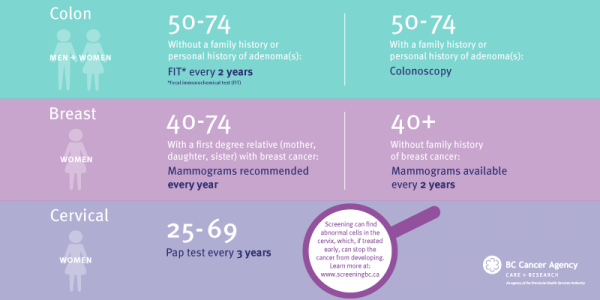Cancer screening: self-care that can save your life!
International Self-Care Day is July 24. Self-care is an important element of maintaining your overall health. While eating well and exercising are important pieces of your self-care routine, regular cancer screening is another vital part; it’s easy and it can save your life.
Regular screening enables your health care providers to prevent or detect cancer early, when it is less likely to have spread, which means that treatment can be started earlier in the course of the disease. Early detection allows for more treatment options and better health outcomes.
The BC Cancer Agency encourages eligible British Columbians to regularly participate in breast, cervical and colon cancer screening.
Breast cancer
Approximately one in eight women will develop breast cancer in her lifetime. Regular screening mammograms can find breast cancer early, usually before it has spread.
Who should have a screening mammogram?
- Women age 40 to 74 without a family history of breast cancer may have a mammogram every two years.
- Women age 40 to 74 with one first degree relative (mother, sister, or daughter) with breast cancer should have a mammogram every year.
A doctor’s referral is not required. Make an informed decision to screen for breast cancer. Visit www.screeningbc.ca/breast to learn more.
Cervical cancer
Cervical cancer usually has no symptoms. Screening for cervical cancer involves a Pap test, which can find abnormal cells in the cervix before they become cancerous. If these abnormal cells are found and treated early, cervical cancer can be stopped from developing. Screening can also identify cancer at an early stage – before it can cause symptoms. If cervical cancer is caught at its earliest stage, the chance of survival is more than 85 per cent.
Who should have a Pap test?
Women between the ages of 25 and 69 should have a Pap test every three years. Talk to your doctor about whether cervical cancer screening is right for you. For more information, visit: www.screeningbc.ca/cervix.
Colon cancer
Colorectal cancer is one of the most commonly diagnosed forms of cancer, affecting one in six people in British Columbia.
Regular colon screening can prevent colon cancer by finding and removing polyps before they turn into cancer. Colon cancer is easier to treat when found at an early stage. With early detection and treatment, survival rates are approximately 90 per cent.
Who should screen for colon cancer?
There are two tests used to screen for colon cancer: the fecal immunochemical test (FIT) and the colonoscopy.
FIT is recommended every 2 years for people who do not have apersonal history of adenomas or a significant family history of colon cancer.
Colonoscopy is recommended every 5 years for people with a strong family history of colon cancer or a personal history of adenomas. For more information, visit: www.screeningbc.ca/colon
For more information
Talk to your doctor about which test is right for you. For more information, visit the Screening BC website
Go to the Screening BC website

